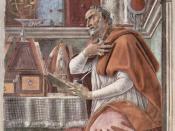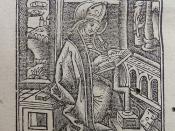The Power of Perversity In Book II of his famous work, Confessions, Saint Augustine discusses the perverse human desire to commit sin. He recounts a tale of stealing pears from his adolescence to demonstrate his excitement in performing an evil deed merely because of its inherent wickedness. His primary motivation lies not in deriving pleasure from tasting the pears but from the thrill of tasting sin and from acting against the will of God. Socrates and Plato, however, differ starkly from St. Augustine in their explanations for the existence of evil in the world. In Socrates' view, individuals never intentionally behave sinfully. He argues that the ignorance of the good is the root of all evil actions. In contrast, Plato, in The Republic claims that the tripartite structure of the soul causes individuals to behave wickedly. Immoral actions result when the appetitive part and/or spirited part triumph over the rational part.
St. Augustine offers the best explanation for immorality because he asserts a coherent and consistent argument that most clearly explains why people commit evil deeds.
In the Confessions, St. Augustine argues perverse desires prompt individuals to commit sinful acts. He uses the example of his adolescent theft of the pears from a neighbor's tree to explore the inner motivations behind sin. St. Augustine concentrates on the sinful nature of stealing. ""æ [He] had no wish to enjoy the things [he] coveted by stealing, but only to enjoy the theft itself and the sin." Although he disobeys and rebels against God in committing this wicked deed, he derives a certain disturbing joy in taking items that do not belong to him. Unlike most immoral individuals, who partake in evil acts because they are motivated by another higher good, Augustine argues that he "æ was not compelled by any lack, unless it were the lack of a sense of justice or a distaste for what was right and a greedy love of doing wrong.
A paucity of his own pears, a curiosity of tasting these foreign pears, the necessity to satisfy his basic need of hunger or even the desire for comradeship could mitigate the wickedness of his deed. Augustine, however, asserts that his depraved character enjoys and even revels in committing the evil act itself. He demonstrates this when he throws most of the stolen pears to nearby pigs. He, along with his comrades, selfishly derives pleasure from the theft alone. He consequently disposes most of the perfectly edible fruit. He prevents other individuals from obtaining any utility by consuming the fruit. In throwing the fruit to the pigs, his intentions lie not in feeding the animals, which can be considered a good. In contrast, he lacks a better means of disposing the stolen materials. In general, the image of pigs carries negative connotations because these creatures are typically dirty, untidy and unruly. These basic traits are also evident in his character. Through his wicked deed, the dirty, untidy and unruly Augustine contaminates the good in the world.
Augustine seeks to understand the cause of evil in the world in order to overcome his wicked ways and "savour [God's] sweetness, the sweetness that does not deceive but brings real joy"æ" Augustine does not expect to be thrown into hell for his theft. However, according to Augustine, taking pleasure in evil for its own sake is the quintessence of evil. Furthermore, he seeks to learn the fundamental source of this evil, which often prevails in a world that is essentially good. He accepts the notion that the benevolent, omniscient and omnipotent God creates people with the free will to perform both good and evil acts. This, by no means, suggests that God is indirectly responsible for the evils committed by the free agents. The main purpose of providing humans with this free will is for them to obey God willingly and not out of any compulsion. God creates the conditions whereby human beings make their choices. Evil results when these humans chose not to follow God's will. Augustine argues that he is given a "æfree rein to amuse [himself] beyond the strict limits of discipline, so that [he] lost [himself] in many kinds of evil ways, in all of which a pall of darkness hung between [him] and the bright light of"æ [God's] truth.
In retrospect, he acknowledges that in stealing the fruit, he distances himself from God. Additionally, he realizes that God never causes people to behave in wicked ways. God guides people toward a path of spiritual happiness. Individuals, who chose to stray from this path, often suffer. Augustine believes that human suffering is punishment for individual sins.
Augustine, also, argues that God's foreknowledge of an evil action does not detract from free will. God's awareness of an act does not directly cause the individual to commit the act. God's benevolence would diminish if he created beings without the ability to do evil. A world in which people lack this ability is more undesirable than a world in which free will and suffering prevail. This is largely because evil contributes to the general goodness in the world. While this is not visible from a limited human point of view, God perceives it in the overall big picture. Augustine asserts that a sense of balance and order exists in this world because of the prevalence of the degrees of goodness.
According to Augustine, evil is not another independent substance but merely a lack of goodness. When individuals perform evil deeds they turn themselves away from God. They depart from God's good, spiritual world in search of something else. Augustine, however, finds it difficult to determine what it is they are searching for.
[Augustine's] soul was vicious and broke away from [God's] safe keeping to seek its own destruction, looking for no profit in disgrace but only for disgrace itself.
This emphasizes the moral of the theft of the pears. Some individuals participate in wicked, sinful deeds merely because they derive a perverse pleasure from the wrongdoing. Nothing in particular draws Augustine to steal the pears except his longing to commit an evil deed. The pears themselves were unattractive to view and eat. However, "[i]f any part of one of those pears passed [his] lips, it was the sin that gave it flavour" Thus, the fruit satisfies his desire to taste his own sin. Augustine, however, after contemplating his prior sinful ways emphasizes it is only through goodness that individuals find the best possible life.
In contrast to Augustine, Socrates, in Plato's The Republic, offers a very different explanation for occurrence of evil in the world. He denies the existence of akrasia, which is the weakness of the will. In his view, individuals respond to their reason, which always aims at some moral good. Evil actions result when an individual is ignorant of the real good. He rejects Augustine's assertion that some individuals commit wicked acts simply because of their desire for wrongdoing. Socrates argues that knowledge is a virtue and ignorance is a vice. He argues that ""æit's through knowledge, not ignorance, that people judge well." Individuals make better decisions when they are well informed about the knowledge of the good. This awareness compels them to perform good deeds. In addition, Socrates asserts that individuals never intentionally commit evil actions. They engage in these acts because their ignorance misguides them. They have no standard for choosing between the moral good and the other objective. They lack the fundamental knowledge of the good, which is necessary to direct them towards the good. Socrates would argue that Augustine is ignorant of the fact that stealing is wrong. In his view, Augustine wants the pears because they are inherently good, as are all of God's creations. Augustine through his consumption seeks to enjoy the goodness within the fruit. This higher good prevents him from realizing the sinfulness of the theft itself. He misconstrues the good in the situation and behaves wickedly. Thus, Socrates emphasizes the need for education among all ranks of society. Only through scholarly learning can individuals realize the good.
In contrast to Socrates, Plato asserts that akrasia exists in the world. Plato describes the soul as constituted of three conflicting parts. The appetitive part responds to basic biological needs, the spirited part reacts to the moral emotions of honor, pride, shame and resentment and lastly the rational part responds to reason and intellect. The human soul, despite the knowledge it may have, does not just yearn for goodness. It also desires earthly happiness. If human soul only consists of reason, it would never commit evil acts. According to Plato, ""æ we learn with one part, get angry with another, and with some third part desire the pleasures of food, drink, sex"æ" This tripartite structure of the soul explains irrational behavior and sinful acts. Evil actions occur when the spirited part either in conjunction or without the appetitive part, overpowers the rational part. The former two parts are incapable of reason. They primarily seek to satisfy immediate gratification. They do not consider the consequences of the actions. Plato would argue that Augustine's theft of the pears was result of a struggle between the spirited and the rational part. While his rational part recognizes that stealing is wrong, his spirited part responds very strongly to his pride. Augustine enjoys the prestige he gains from his comrades when he commits the theft. Thus, these conflicting desires, whereby his pride overpowers his reason, result in his irrational and sinful behavior.
While St. Augustine, Socrates, and Plato offer different explanations for the occurrence of evil in the world, the former provides the most coherent and consistent argument. Augustine intentionally steals the fruit because he gains a disturbing pleasure from the wrongdoing. Socrates, in contrast, argues that Augustine is ignorant and unaware of the wrongfulness in taking another's possessions. However, Augustine openly admits that he loves the evil that fills his soul as he steals the fruit. He seeks no higher good in the situation. Thus, Socrates provides an unsatisfactory explanation because the weakness of Augustine's will is clearly evident. In addition, Plato's argument that pride dominates reason is weak. It is difficult to perceive the soul as constituted by three independent conflicting parts. Plato asserts that the appetite and the spirit are noncognitive. However, if these parts lack the abilities to reason, then they would never be able to overpower the rational part. For this reason, there must be a cognitive component to both the appetitive and spiritual parts. This, in turn, blurs the clear boundaries between the three distinct parts. In Augustine's situation, there is no inner conflict. Neither his hunger nor his pride challenges his reason. He merely desires the fruit and likewise steals it because it is wrong to do so. Thus, it is Augustine's theory that provides the best explanation for his evil deed.
Saint Augustine most clearly explains his reasons for turning away from God and stealing the pears. He asserts that evil actions occur because God creates individuals with free will. While Socrates and Plato provide interesting reasons for the prevalence of evil in the world, these philosophers fundamentally fail to capture the perversity that drives Augustine to commit the evil deed.





